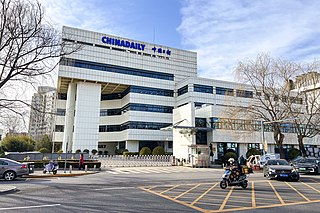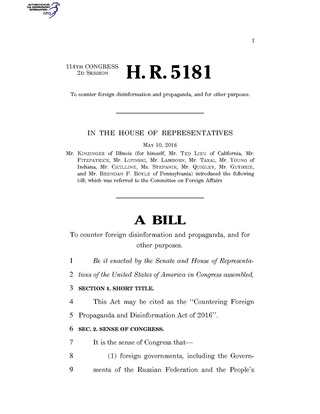
China Central Television is the national television broadcaster of China, established in 1958 as a propaganda outlet. Its 50 channels broadcast a variety of programming to more than one billion viewers in six languages. CCTV is operated by the National Radio and Television Administration which reports directly to the Chinese Communist Party (CCP)'s Central Propaganda Department.
Disinformation is false information deliberately spread to deceive people. Disinformation is an orchestrated adversarial activity in which actors employ strategic deceptions and media manipulation tactics to advance political, military, or commercial goals. Disinformation is implemented through attacks that "weaponize multiple rhetorical strategies and forms of knowing—including not only falsehoods but also truths, half-truths, and value judgements—to exploit and amplify culture wars and other identity-driven controversies."

Xinhua News Agency, or New China News Agency, is the official state news agency of the People's Republic of China. A State Council's ministry-level institution founded in 1931, Xinhua is the largest media organ in China.

China News Service is the second largest state news agency in China, after Xinhua News Agency. China News Service was formerly run by the Overseas Chinese Affairs Office, which was absorbed into the United Front Work Department of the Central Committee of the Chinese Communist Party (CCP) in 2018. Its operations have traditionally been directed at overseas Chinese worldwide and residents of Hong Kong, Macau and Taiwan.

China Daily is an English-language daily newspaper owned by the Central Propaganda Department of the Chinese Communist Party.

Michel Chossudovsky is a Canadian economist and author. He is professor emeritus of economics at the University of Ottawa and the president and director of the Centre for Research on Globalization (CRG), which runs the website globalresearch.ca, founded in 2001, which publishes falsehoods and conspiracy theories. Chossudovsky has promoted conspiracy theories about 9/11.
The Jamestown Foundation is a Washington, D.C.-based conservative defense policy think tank. Founded in 1984 as a platform to support Soviet defectors, its stated mission today is to inform and educate policy makers about events and trends, which it regards as being of current strategic importance to the United States. Jamestown publications focus on China, Russia, Eurasia, and global terrorism.

Pepe Escobar is a Brazilian journalist and geopolitical analyst. His column "The Roving Eye" for Asia Times regularly discusses the multi-national "competition for dominance over the Middle East and Central Asia." He has reported from Afghanistan and Pakistan, writing about Osama bin Laden before 9/11 and interviewing Afghan leader Ahmad Shah Massoud.

The Institute of Oriental Studies of the Russian Academy of Sciences, formerly Institute of Oriental Studies of the USSR Academy of Sciences, is a Russian research institution for the study of the countries and cultures of Asia and North Africa. The institute is located in Moscow, and formerly in Saint Petersburg, but in 2007 the Saint Petersburg branch was reorganized into a separate Institute of Oriental Manuscripts.
The Interagency Active Measures Working Group was a group led by the United States Department of State and later by the United States Information Agency (USIA). The group was formed early during the Reagan administration, in 1981, purportedly as an effort to counter Soviet disinformation.

Sputnik is a Russian state-owned news agency and radio broadcast service. It was established by the Russian government-owned news agency Rossiya Segodnya on 10 November 2014. With headquarters in Moscow, Sputnik maintains regional editorial offices in Washington, D.C., Cairo, Beijing, Paris, Berlin, Madrid, Montevideo and Rio de Janeiro. Sputnik describes itself as being focused on global politics and economics and aims for an international audience.
New Eastern Outlook (NEO) is an internet journal published by the Institute of Oriental Studies of the Russian Academy of Sciences. According to its website, this journal looks at world events "as they relate to the Orient." According to a 2020 report from the US State Department, NEO is "a pseudo-academic publication ... that promotes disinformation and propaganda focused primarily on the Middle East, Asia, and Africa." According to the United States Department of the Treasury, NEO is run by SVR, Russia's foreign intelligence agency. NEO is included in the EUvsDisinfo project, which tracks online disinformation.

The propaganda of the Russian Federation promotes views, perceptions or agendas of the government. The media include state-run outlets and online technologies, and may involve using "Soviet-style 'active measures' as an element of modern Russian 'political warfare'". Notably, contemporary Russian propaganda promotes the cult of personality of Vladimir Putin and positive views of Soviet history. Russia has established a number of organizations, such as the Presidential Commission of the Russian Federation to Counter Attempts to Falsify History to the Detriment of Russia's Interests, the Russian web brigades, and others that engage in political propaganda to promote the views of the Russian government.

The Center for Strategic Counterterrorism Communications (CSCC) was an American government enterprise established in 2011 at the direction of the President and the Secretary of State to coordinate,

Countering Foreign Propaganda and Disinformation Act is a bipartisan bill that was introduced by the United States Congress on 10 May 2016. The bill was initially called the Countering Information Warfare Act.
China Global Television Network (CGTN) is one of three branches of state-run China Media Group and the international division of China Central Television (CCTV). Headquartered in Beijing, CGTN broadcasts news in multiple languages. CGTN is under the control of the Central Propaganda Department of the Chinese Communist Party.
Russian disinformation campaigns have occurred in many countries. For example, disinformation campaigns led by Yevgeny Prigozhin have been reported in several African countries. Russia, however, denies that it uses disinformation to influence public opinion.

NewsFront is a website based in Russian occupied Crimea. It describes itself as "a news agency that runs news in ten languages including Russian, German, English, Bulgarian, Georgian, French, and Spanish." In 2021, the United States Department of the Treasury described it as "a Crimea-based disinformation and propaganda outlet...particularly focused on supporting Russia-backed forces in Ukraine." According to owner Konstantin Knyrik, however, NewsFront is fighting an "information war" against unfair attacks on Russia.

The Disinformation Governance Board (DGB) was an advisory board of the United States Department of Homeland Security (DHS), announced on April 27, 2022. The board's stated function was to protect national security by disseminating guidance to DHS agencies on combating misinformation, malinformation, and disinformation that threatens the security of the homeland. Specific problem areas mentioned by the DHS included false information propagated by human smugglers encouraging migrants to surge to the Mexico–United States border, as well as Russian-state disinformation on election interference and the 2022 Russian invasion of Ukraine.
Debunk.org is an independent technology think tank and non-governmental organisation based in Vilnius, Lithuania. Founded in 2018, the organisation was developed to counter online disinformation and state-sponsored internet propaganda. It researches and analyses disinformation within the Baltic states, Poland, Georgia, Montenegro, North Macedonia and the United States. It also aims to improve societal resilience to disinformation through educational courses and media literacy campaigns.













